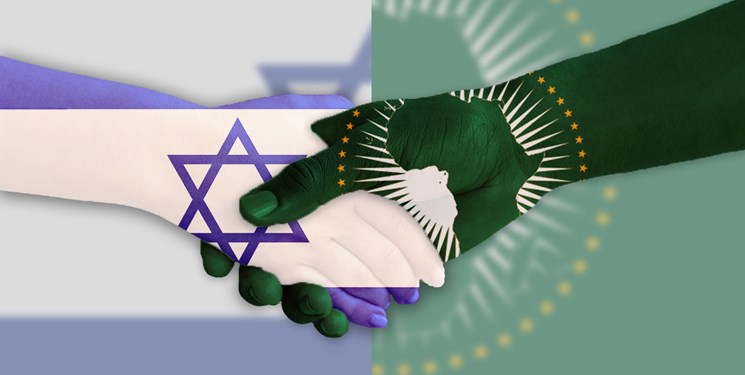Speaking in an interview with the website of the Strategic Council on Foreign Relations, Yasser Kanani referred to the decision of the Executive Council of the African Union to consider accepting the Zionist regime as an observer member in the Union at the forthcoming February meeting, as well as several hours of debate among the foreign ministers of the member states in this regard, adding: The countries that oppose this membership, especially Algeria and South Africa, managed the opposition regarding the membership.
Coordination to oppose Zionist observer membership in African Union
Referring to the remarks of the Algerian Foreign Minister, Ramatan Lamara, who had said ‘many countries, especially Algeria, oppose this unfortunate and dangerous decision and support the supreme interest of Africa based on the unity of its peoples,’ he noted: Algeria, and especially South Africa, have good experience in anti-apartheid movements and one of the main supporters of Palestine in Africa is South Africa. Such efforts led 24 African countries to join the opposition to the Zionist regime’s membership in the African Union.
The expert on Africa affairs continued: Moussa Faki Mahamat, the Chairperson of the African Union Commission, followed this decision without consulting the executive board, and in his speech to the members last week, without directly mentioning this issue, underlined the need for attracting new financial partners for the African Union and the structure of executive affairs.
Kanani said: From the day the issue of the membership of the Zionist regime was raised, various countries became active, especially with the centrality of South Africa and Algeria. Such developments and positions show that the Zionist regime still has problems entering the Black Continent, especially the structure of the African Union, which has a legal and coherent structure.
Zionist regime’s attempts to enter into main institutions of Africa
Referring to the Zionist regime’s efforts to sign bilateral agreements with African countries and carry out economic projects in those countries, he added: The Zionist regime has a limited presence in some countries and has activated its political representations, especially due to its experience in the field of agriculture and management of drought, has focused on technical models and technical cooperation with some African countries and exchanged experiences and projects.
Saying that the Zionist regime seeks to consolidate and legitimize its presence in Africa, Kanani said: With the support of the African Union structure, especially the chairperson of the Union Commission, the regime is trying to make this plan a reality and take advantage of more privileges. Therefore, it has undertaken active diplomacy to be present in the main institutions as an observer.
Instability, rift in African Union with Zionist regime’s membership
The analyst of Africa affairs, saying that Kuwait, Jordan, Egypt, Algeria, Yemen, the archipelago of Qamar, Djibouti, Libya, Mauritania, Tunisia, Qatar, Palestine and the Arab League delegation to the African Union Commission in an official document strongly protested the Union’s unilateral action on the membership of the Zionist regime as an observer and called on the African Union to rescind its decision, stating: If the regime’s membership in the African Union is achieved, with regard to the integrity and unity that the Union has shown so far in global crises and international issues, it will be shaken and the pan-African spirit of the Union will be shattered.
Referring to the Algerian Foreign Minister’s remarks that the Zionist regime’s membership in the African Union as an observer in the African Union will cause division and disintegration in the Union, Kanani continued: Countries like Algeria and South Africa that have a correct understanding of global and African developments are trying to maintain this spirit and create a strong front to prevent the Zionist regime from achieving its objective and infiltrating into the Union through the African Union Commission and by giving promise.
Behind the scenes role of international powers
He stressed: Certainly, behind the scenes of this observer membership in the African Union, international powers also play a role; because given their position in Africa and the African Union, they are lobbying and pursuing covert diplomacy on a large scale.
The expert on Africa affairs referred to the recent visit of the Israeli Foreign Minister Yair Lapid to Morocco and his dissatisfaction with Algeria’s role in launching a campaign against Israel’s acceptance to the African Union and said: It seems that the role of the Kingdom of Morocco should be great in this treason and in attempting to make the Zionist regime an observer in the African Union. In this regard, the traditional rivalries that Morocco has with the Algerian government should be considered.
Improbability of Zionist regime’s membership
Kanani stressed: Given the recent developments and positions of African countries, if the scenario of the Zionist regime membership in the African Union succeeds, African countries will be divided on international issues.
At the same time, he said: Given the opposition of countries to the regime’s observer membership in the African Union, such measure will not be easily achieved and does not seem likely. In fact, acceptance of this membership will shake the pan-African spirit in the African Union and will have a negative impact on public opinion and among anti-apartheid activists.










0 Comments